
The NFU has called for the Environmental Land Management schemes (ELMs) to 'succeed in the hills' following concern over a possible drop in upland farmers' incomes.
NFU deputy president David Exwood met with the new Farming Minister Daniel Zeichner and the wider Defra team in the uplands to discuss the concern.
The union said the meeting, which took place on an upland farm in Lancashire, gave the government the opportunity to see "the realities of farming in the uplands".
They were also able to see the current barriers of the Sustainable Farming Incentive (SFI) for upland farms, it added.
According to research by the NFU, upland farms will be unable to make up for the loss of income if post-Brexit support payments do not recognise the work they do for rural communities.
On average, the remodelling showed that upland farms lost 37% of their support payments under the current SFI and Countryside Stewardship options available to them.
Following the meeting, NFU deputy president David Exwood said it was 'a great opportunity' to have the minister and Defra team out on farm in Lancashire.
He said: “They saw for themselves the vital role upland farmers play in producing food while also being stewards of some of the country’s most cherished landscapes.
“For ELMs to be a success it has got to work for all farm businesses, including those in the uplands.”
Mr Exwood said that while there were positive increases in the number of options available for upland farmers under SFI, there "still remains challenges" about how hill farms will be profitable while working to the income forgone model.
“We need to give upland farmers confidence and certainty by seeing a clear strategy from Defra on its vision for the future of the uplands,” he added.
“The creation of an uplands working group is also key to ensuring upland businesses are part of the solution to Defra’s environmental ambitions.”
What is the NFU asking for?
For ELMs to be a success in the uplands, the NFU is calling for:
• A new uplands working group to allow further discussions about how upland businesses are part of the solution to Defra’s environmental ambitions
• Defra to undertake and publish an impact assessment of the current ELMs offer and a transition for upland businesses from direct payments
• Clarification on ‘heavy sheep’ on the hills and how this limits upland business’s ability to apply for SFI
• A clear strategy from Defra on its vision for the uplands and how businesses remain viable, profitable businesses
• Wider SFI options available to upland farmers to be detached from destocking and shepherding actions (UPL1-3 and UPL7-10)
• Defra to give allowances for supplementary feeding within moorland options (UPL1-3, UPL7-10)
• Moorland stocking actions (UPL1-3) to be based on an average stocking density rather than a maximum rate
